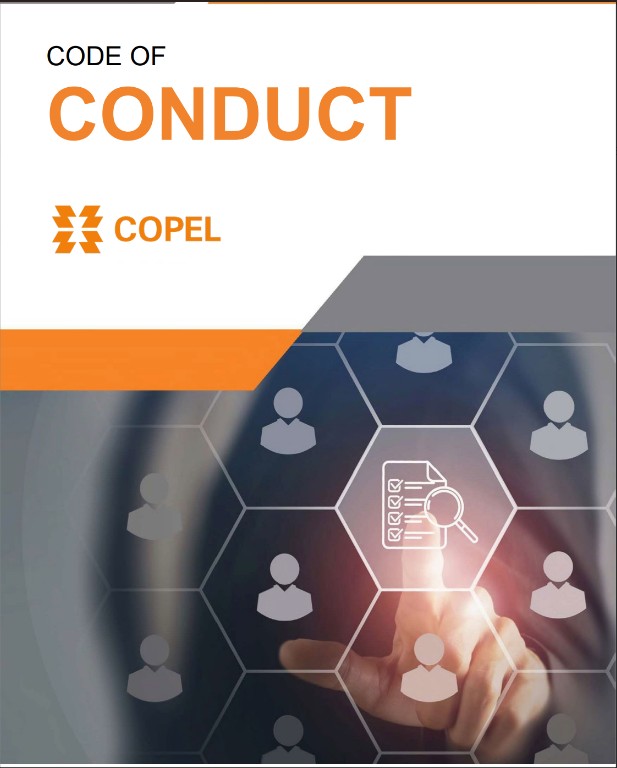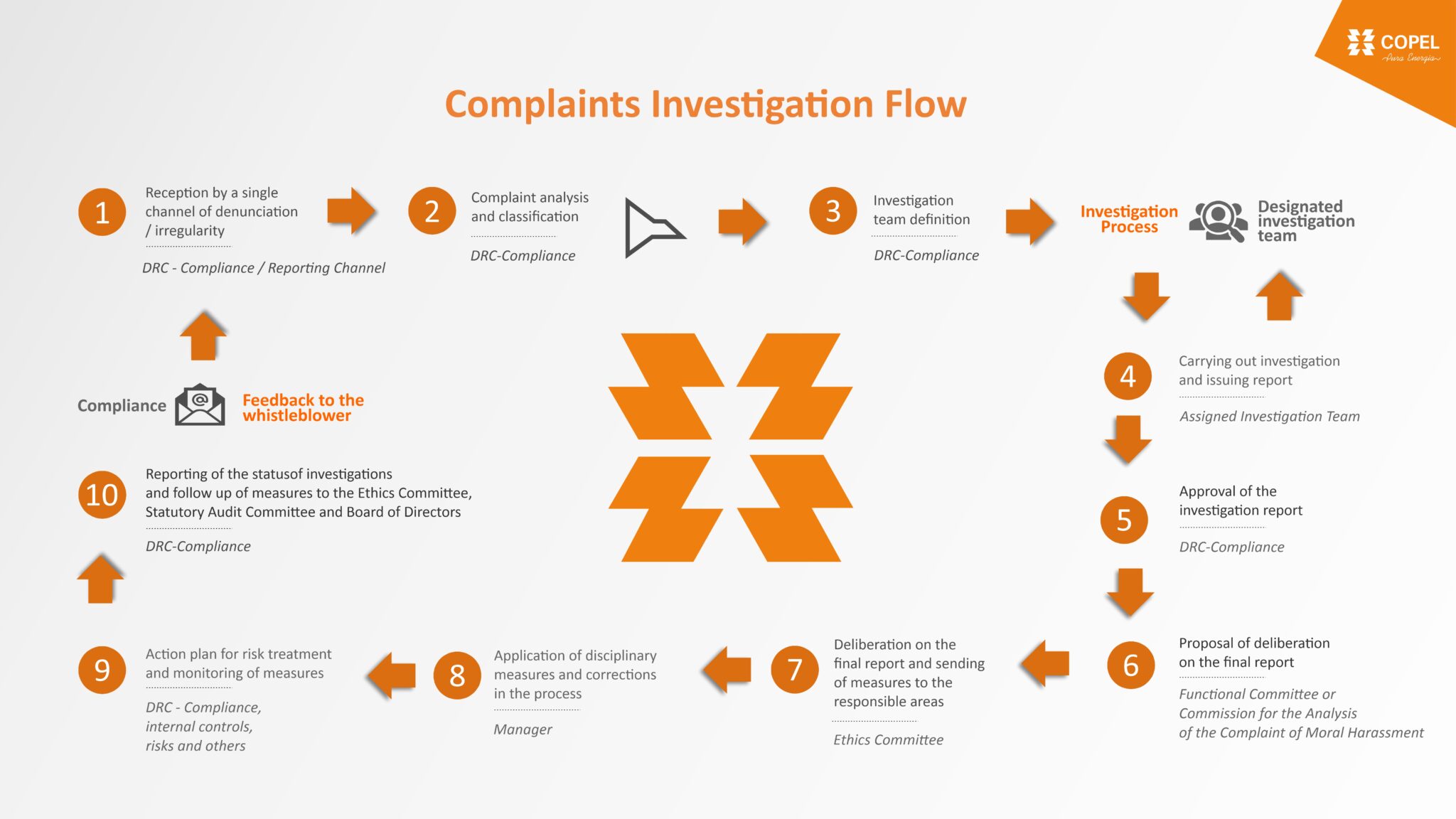Discrimination and Harassment
Among Copel’s values, set forth in the Company’s strategic reference framework, are ethics and respect for people, which guide its actions with related parties and stakeholders, values the trust earned throughout its history and encourages consideration and courtesy towards others. The company is committed to supporting, protecting and preserving human rights and labor relations, adopting policies and practices that contribute to this end.
Copel’s Sustainability Policy and People Management Policy establish the guidelines for the respect for diversity, plurality and human rights and for the combat against discrimination and harassment, as well as providing for the Code of Conduct as an instrument of accepted and not tolerated conduct within the scope of the Company’s activities.
The Code of Conduct provides for recommended conduct and establishes unacceptable conduct, including discrimination and harassment (moral and sexual). Copel’s attitude towards such cases, provided they are justified, is of zero tolerance. Accusations can be made through a specific and independent channel and the cases that are found to have grounds receive corrective or disciplinary measures, according to the Company’s rules.
The Code of Conduct applies to all employees, interns, suppliers, service providers, outsourced workers, directors and officers of the Holding Company, as well as of its wholly-owned subsidiaries. Since the adoption of our Code of Conduct, we have not granted any implicit or explicit waiver of any section of our Code to the persons to whom it applies.
Among the conducts not accepted in the Code of Conduct is the practice of discrimination under any excuse and to any person because of: color, ethnicity, social class, political conviction, birthplace, sex, gender identity, sexual orientation, creed, religion, cult, age, disability, disease, ideology, regional origin, appearance, nationality, marital status, education, hierarchy, position, function or others.
Copel also does not tolerate any manifestation of moral harassment which, by definition, is characterized by any abusive and repetitive conduct, manifested mainly by behavior, words, acts, gestures and written materials that may bring damage to the personality, dignity or physical or psychological integrity of a person, jeopardizing his/her employment or degrading the work environment and creating embarrassment;
The Company strongly repudiates sexual harassment, which is conduct of a sexual nature, manifested physically, by words, gestures or other means, proposed or imposed to people against their will, causing them embarrassment and violating their sexual freedom. Sexual harassment violates the dignity of the human person and the fundamental rights of the victim, such as freedom, intimacy, private life, honor, equal treatment, the social value of work, and the right to a healthy and safe work environment.
In order to promote a safe and respectful work environment for everyone, Copel has:
- the Integrity Program, whose purpose is the correct treatment of ethical and conduct deviations; and
- the Permanent Diversity Commission, whose objective is to raise awareness among employees and, to this end, maintains an internal portal dedicated to informing employees, in addition to promoting training, communications, and other events.
The principles that guide Copel’s actions of Integrity and Socio-environmental Responsibility are based on the Company’s values, on the Code of Conduct and on voluntary commitments undertaken, such as Agenda 2030 and the Global Compact of the United Nations (UN).
Reporting Channel
Copel’s Denunciation Channel is a secure means for registering denunciations about fraud, corruption, discrimination, moral and sexual harassment, ethical and conduct deviations and other irregularities, and also for consultations related to the Code of Conduct. All the information is received by an external, independent company specialized in receiving complaints from both the internal and external public.
All reports that contain information that can identify the whistleblower are de-identified by the contracted company, if the whistleblower has chosen to speak anonymously, and forwarded to the investigation team of the Integrity Coordination of the Governance, Risk and Compliance Department (DRC).
The investigation process is structured to ensure confidentiality in handling the complaints received, which includes reserved physical facilities, restricted access to documents, reports and all the work done.
Corrective or Disciplinary Measures
Copel has an internal functional discipline standard, whose purpose is to establish criteria for the application of disciplinary measures within the scope of Companhia Paranaense de Energia – Copel (Holding) and its wholly-owned subsidiaries (SIs).
The functional discipline rule provides for the scaling of disciplinary measures according to the seriousness of the misconduct. Faults are acts that go against legal provisions, the employment contract, corporate standards, and the Code of Conduct, which can be divided into: light, medium, or serious faults. According to the fault, a disciplinary measure is applied, which is recorded in the employee’s employment history.
Among the situations subject to punishment provided for in the rule, those that fall under article 482 of the Consolidation of Labor Laws (CLT) stand out as practicing sexual harassment, an act of a sexual nature or sexual harassment on the premises or in the work environment (incontinence of conduct); as well as practicing or encouraging any type of discriminatory act or harassment of a moral nature (bad procedure).
In this sense, discrimination, moral harassment and sexual harassment are considered faults that go against the values and provisions of the Company’s Code of Conduct, being liable to the application of disciplinary measures, according to the severity scale provided for in the rule. Copel vehemently repudiates discrimination, moral harassment and sexual harassment, and these acts are described as “unacceptable conduct” in the item “Respect” of the Code of Conduct, as transcribed below:
Respect
Unacceptable conduct:
To discriminate against any person, because of color, ethnicity, social class, political conviction, birthplace, sex, gender identity, sexual orientation, creed, religion, worship, age, disability, illness, ideology, regional origin, appearance, nationality, marital status, schooling, hierarchy, position, function or others.
To practice or encourage any kind of harassment, especially moral, sexual and economic ones, which includes verbal or physical conduct of humiliation, coercion or threat to employees, administrators, contractors, trainees or any other person.
Failure to report to the immediate manager or the competent channels any situation of harassment as soon as it is detected.
Commission for the Analysis of Harassment Complaints
The Commission for the Analysis of Bullying Complaints (Cadam) was created in 2009, establishing rules for the handling of bullying complaints in the Company. The Commission is responsible for analyzing reports of moral harassment and, when appropriate, submitting the report to the Ethics Committee. The creation of the Commission made Copel a pioneering company in the country in the implementation of a preventive process that ensures humane and healthy practices in people management.
As a complementary attribution, Cadam is responsible for guiding employees in relation to the prevention of moral harassment, in line with social responsibility and the best corporate governance practices.
All reports of moral harassment are forwarded to the Reporting Channel, thus allowing greater control over the number of reports and also analyzing the reasons behind them, thus subsidizing awareness programs.
Internal Commission for Accident Prevention and Sexual Harassment
The Internal Commission for the Prevention of Accidents and Sexual Harassment (CIPA), amended by MTP Ordinance No. 4,219 of December 20, 2022, is composed of representatives of the employer and employees, with the objective of promoting the prevention of accidents and work-related diseases, in order to contribute to a safe and healthy work environment with a focus on preserving life, promoting worker health and combating sexual harassment. This is a requirement of Brazilian legislation, provided for in Federal Law No. 13,174/2001.
Sexual Harassment in the Workplace Booklet
The Labor Public Ministry (MPT) has prepared and made available on its website a question-and-answer booklet with the main guidelines on the topic of Sexual Harassment at Work.
Copel has also prepared and made available a guidance booklet on the theme: Sexual Harassment in the Workplace.






